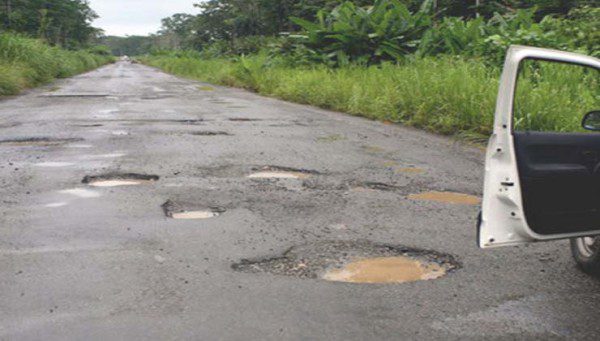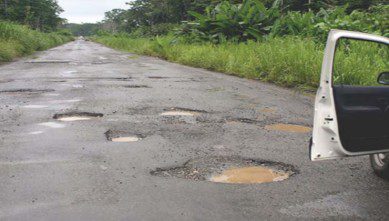National Issues
Our Roads, Our Lives -By Is’haq Modibbo Kawu

We walked through broken braids of steel And fallen acrobats. The endless safety nets Of forests prove a green deception Fated lives ride on the wheels of death when, The road waits, famished “May we never walk When the road waits, famished –WOLE SOYINKA in IDANRE AND OTHER POEMS (1967)

The news broke at the weekend, of the tragic death of Nigeria’s Minister of State for Labour and Productivity, James Ocholi, wife and a son, on the Kaduna Highway. The frightening destruction of their SUV vehicle went viral online at the weekend, as Nigerians came to terms with the loss of a prominent citizen, on a day when several other citizens would have been killed on our national network of roads unsung, and in a ritual pattern that has become a part of our lives in Nigeria.
Just as I was thinking of writing about the unending rituals of deaths and accidents, the news wires began reporting the death through an accident on the Maiduguri-Damaturu road, of General Yasha’u Abubakar, the Head of Training and Operations of the Nigerian Army. He had been at the forefront of the fight against the Boko Haram insurgency. The General Officer Commanding the Army’s 3rd Division, Brigadier General MSA Aliyu had also sustained injuries in the same accident.
Clearly, Nigerian roads are a veritable danger to the lives of Nigerian people! And in a bizarre sense, we get angry and frightened about these unending patterns of carnage but have not thought out a proper attitude to arresting them. We are lost in a fatalistic surrender to metaphysics, in a country where the wellbeing of citizens counts for very little and where there has been entrenched a ritual of budgeting, especially for the construction and rehabilitation of roads. They either disappear as we saw under the Obasanjo administration; or the roads stay like forever under construction, as we see on the Lokoja-Abuja expressway, that has been on since 2002.
Worsened state of roads
The picture is the same all over Nigeria, even when weekly meetings of the Federal Executive Council cannot stop announcing the awards of various roads contracts; things have progressively worsened on Nigerian roads. I drove on the Abuja-Kaduna road last Friday, and the many potholes are such a danger, because a lot of times, it was the couple of seconds before reaching them that one would discover them.
If the driver is lucky, you attempt to avoid them and that can be the veritable source of a worse form of danger, because the effort could go awry, leading to a dangerous accident. When you cannot avoid them, you enter those potholes and by the time you arrive at your destination, if you are lucky to arrive safely, you are obliged to fix some damages in the vehicle as I ended up doing on Friday afternoon in Kaduna. It was on that same stretch of road that Minister Ocholi, wife and son tragically lost their lives! It was in 2002, that Sam Nda-Isaiah described potholes on Nigerian roads, big enough to swallow small cars. Those potholes are still there, have multiplied and are not only swallowing small cars, but they continue to consume Nigerian lives!
Highest accident rate
There is a sobering study done by Vitus N. Ukoji titled: “TRENDS AND PATTERNS OF FATAL ROAD ACCIDENTS IN NIGERIA (2006-2014). The report, using the Nigeria Watch database, showed that 15, 090 lives were lost to fatal road accidents in 3, 075 events, between June 2006 and May 2014. On a national scale, Lagos recorded the highest number of fatalities (1, 579 deaths from 620 accidents), while the FCT (Abuja) had the highest relative number of deaths (0.6 deaths per 100, 000 inhabitants).
The report went further to state that Nigeria “is ranked second-highest in the rate of road accidents among 193 countries of the world”. As a matter of fact, the WHO “adjudged Nigeria the most dangerous country in Africa with 33.7 deaths per 100, 000 population every year”. Furthermore, the WHO report said: “one in every four road accident deaths in Africa occurs in Nigeria”.
The WHO survey as well as the FRSC reported 5, 693 fatal road accidents in Nigeria in 2009. The causes of these accidents were then categorised into human, environmental and mechanical factors, with the human factor being responsible for 90% of accidents, while the mechanical and environmental factors take the remaining 10%. The human factors include visual acuteness, driver fatigue, poor knowledge of road signs and regulations, illiteracy, health problems, excessive speeding, drug abuse and over-confidence while at the steering wheel.
In an interview that I did with Olu Agunloye, pioneer head of the FRSC for Radio France International, many years ago, he added a Road Accidents Immunity Delusion Syndrome (RAIDS) as one of the most dangerous factors in understanding road accidents in Nigeria! There are Nigerians deluded enough to believe that they carry some form of immunity against accidents.
They would do very dangerous things, such as drink heavily, and somehow believe that they cannot have an accident! The mechanical factors leading to Nigerian road accidents include poor vehicle maintenance, tyre blowouts, poor lights, un-roadworthy vehicles and broken down vehicles on roads without adequate warning. And the environmental factors include heavy rainfall, Harmattan winds, sun reflection, heavy wind, potholes and untarred roads.
Accident and human factor
It is clear that the human factor has been the most important factor in our roads accidents. On the part of the ruling elite, there is the very dangerous “convoy culture”, when government officials are driven dangerously at top speed, without respect for any forms of regulation. They endanger their own lives, because in a lot of instances, the “Big Man” in the “owner’s corner”, does not deploy the seatbelt, and if an accident happens, his life is the most endangered. When they are not endangered, they cause serious problems for other road users.
Where that “convoy” culture-from-hell emerged from has not been sufficiently interrogated in the Nigerian social space, but they have ruined the lives of so many citizens, including the lives of members of the Nigerian ruling elite.
But we cannot continue to harvest the death of citizens, including the very best of our society, those that should be alive helping to build our country. There is a major struggle to wage against our human weaknesses as citizens, but the state and its institutions must play their roles in making citizens to obey the basic rules of engagement that must apply in the building of a modern society.
Citizens in society and civil society organisations must also help in the creation of a civic culture of personal and collective sense of responsibility and the respect of the rights of all other citizens, especially as we drive on our roads. While there is a worldwide acknowledgment of the phenomenon of road rage, I think its Nigerian manifestation, as in all other negative social indices, is truly frightening!
If we can combat the human factor that is responsible for 90% of accidents on our roads, it might be much easier to wage a collective battle against the mechanical and environmental factors which account for 10% of the accidents in our country. Surely, it cannot make anyone of us happy, that we have Africa’s highest levels of road accidents and the second highest on earth. The deaths of Minister Ocholi and members of his family, surely diminish our humanity all, because we are all involved in mankind, as the Poet John Donne, reminded: “So never ask for whom the bell tolls; it tolls for thee”!



















